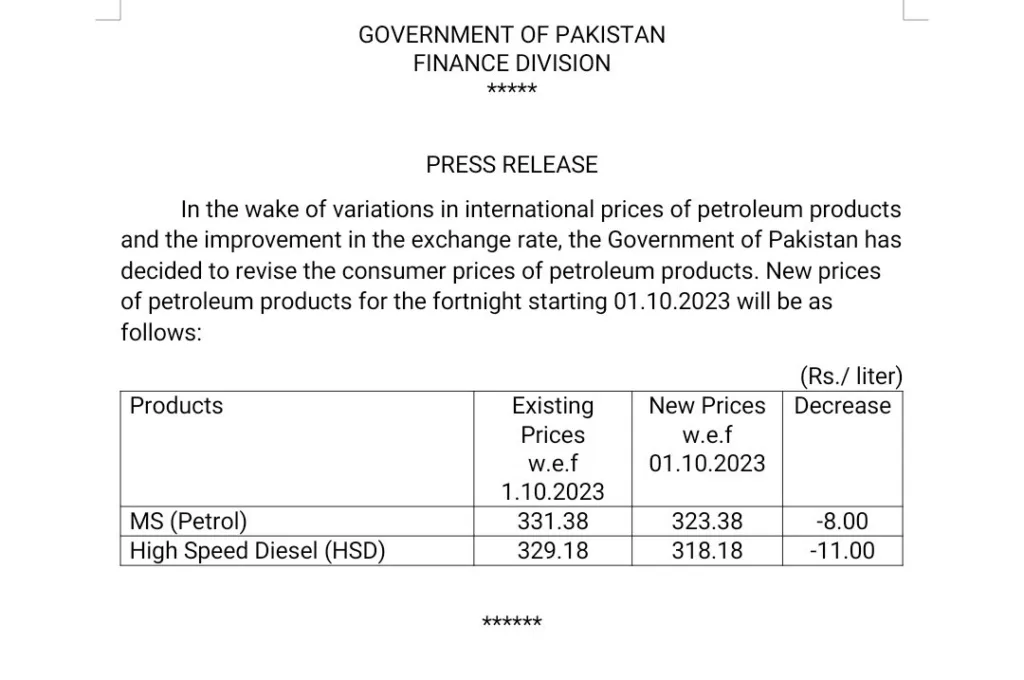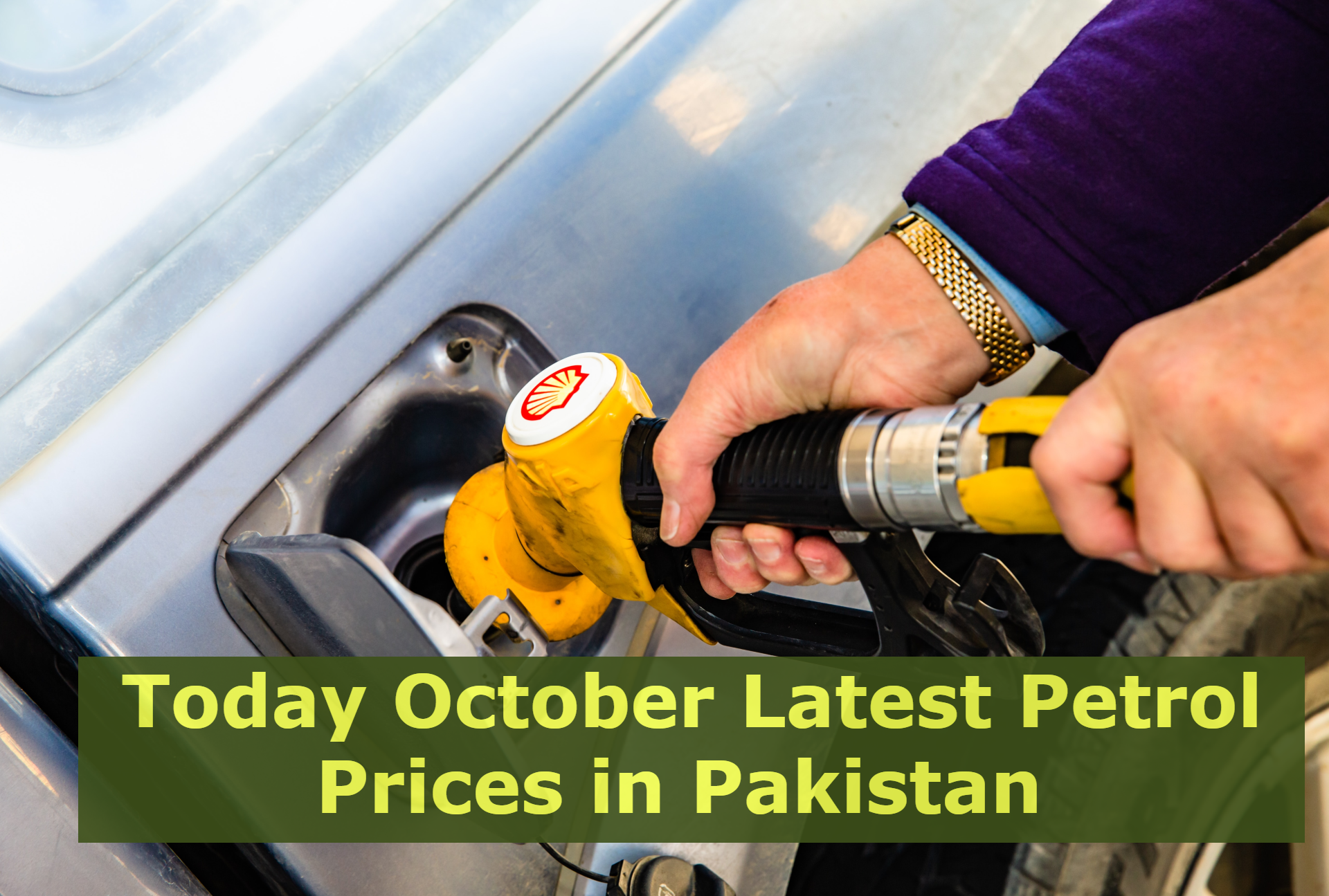Amidst the winds of change and a nation on the brink of transformation, whispers of a significant announcement echo through the corridors of power. Today, we delve into the realm of petrol prices in Pakistan and the possibility of a remarkable reduction that could leave an indelible mark on our lives. As we embrace this corporate journey infused with elements of luxury and nostalgia, let us explore the potential impact of this momentous decision.
Good news for the people of Pakistan! The caretaker government has announced a reduction in the price of petrol by Rs8 per litre for the next fortnight starting from October 1. This is a welcome relief for the masses who have been struggling with inflation for the past few months. Along with petrol, the price of diesel has also been reduced by Rs11 and the price of kerosene oil has been slashed by Rs7.53 per litre. The new prices of these commodities will take effect from midnight today. This move by the government will certainly help ease the burden on the common man’s pocket and provide them some relief.
Today Latest Petrol Prices in Pakistan
| PRODUCT | OLD PRICE (PKR) | NEW PRICE (PKR) | CHANGE (PKR) |
|---|---|---|---|
| Petrol | 331.38 | 323.38 | -8.00 |
| High Speed Diesel (HSD) | 329.18 | 318.18 | -11.00 |

Expectations for the Next 15 Days in Pakistan
Brace yourselves, petrol enthusiasts! Exciting news awaits as we delve into the anticipated petrol price fluctuations from October 1st to October 15th. Get ready to embark on a journey through time, exploring the world of corporate dynamics and the ever-changing fuel market. In this blog post, we will dissect the recent developments in petrol prices, taking you along on a luxurious ride laced with nostalgia and exclusivity.
The Dawn of Relief: A Glimpse into Potential Price Cuts
As we find ourselves amidst an era of record-high fuel prices, there is finally a glimmer of hope on the horizon. Brace yourself for some good news – it seems that relief may finally be headed our way! The government has taken a momentous decision to pass on this relief to the citizens in the form of reduced petrol prices during the first half of October.
The expected drop in fuel prices can be attributed to a cut in its international price from $101 to $99 per barrel. This significant decline brings with it promises of respite for individuals who have been grappling with soaring petrol expenses. If all goes according to plan, we can expect petrol prices to hover around Rs310-320, while diesel is likely to plunge between Rs315-320.
A Proposal That Holds Promise
In the wake of a resolute crackdown on illegal activities, a glimmer of hope emerges for every citizen traversing the bustling streets. It is said that from October 1st, 2023, there may be an unprecedented reduction in petrol prices by Rs15 per litre. This proposition carries with it the potential to alleviate burdens and offer respite in our daily endeavors. Moreover, high-speed diesel might also witness a decrease of Rs10 per litre while light diesel oil could see its price diminish by Rs12 per litre. The proposal extends further to contemplate an Rs8 reduction in kerosene prices as well. However, it is important to note that these decisions rest ultimately with our esteemed Prime Minister after consultations with the Finance Ministry.
Unveiling the Veil: The Inner Workings
Behind every monumental decision lies a web intricately woven with calculations and considerations. Caretaker Finance Minister Dr Shamshad Akhtar recently shared invaluable insights during her briefing on the country’s economic situation with the Senate Standing Committee on Finance. In her address, she revealed that excessive expenditures exceeding income have laid bare Pakistan’s economic challenges. A staggering Rs 1,300 billion hangs precariously as tax exemptions an amount deemed unsustainable for a nation seeking fiscal stability.
Dr Shamshad Akhtar eloquently expressed her belief in levying capital gains tax on immovable assets, a measure that could potentially steer us toward a more balanced economic landscape. As the conversation unfolded, she highlighted the stabilization of exchange rates, with the mighty dollar descending to Rs 288. Remittances witnessed an encouraging surge, while import restrictions were gracefully lifted from our collective shoulders.
The Road Ahead: Navigating Uncertain Terrain
As we embark on this journey marked by anticipation and intrigue, it is imperative to acknowledge that these proposed changes harbor far-reaching implications. The reduction in petrol prices has the potential to alleviate financial burdens for both individuals and businesses alike. With an intricate web of levies and duties imposed upon petrol and diesel—Rs.60 per litre and Rs.50 per litre respectively—such a significant reduction can pave the way for a more prosperous future.
In this shifting landscape, where change is both imminent and necessary, we find ourselves poised at the threshold of transformation. Our economy, like a phoenix rising from its ashes, yearns for stability and resilience. It is crucial to embrace these moments of change as opportunities for growth, prosperity, and progress.
A Glimpse into the Past: Nostalgia Meets Progress
Amidst all this corporate discourse and economic intricacies lies a sense of nostalgia—a longing for simpler times when luxury was cherished with reverence. As we navigate the complexities of today’s world, let us not forget our roots or forsake those elements that make us who we are.
In times gone by, petrol stations were emblematic of grandeur a place where elegance met functionality. Attendants donning crisp uniforms ushered in an era where service was accompanied by genuine warmth and care. The sound of engines humming in harmony became a symphony signifying progress and freedom a melody that echoed through time.
Embracing Change: A Brighter Future Beckons
As we conclude this chapter on petrol prices in Pakistan today, we find ourselves at the precipice of a new era a time of transformation and possibility. The proposal to reduce petrol prices by Rs15 per litre, alongside other potential reductions, holds within it the promise of a brighter future where financial burdens are alleviated and dreams find wings to soar.
Let us embrace this journey with open minds and hearts, cherishing both the corporate nature of progress and the luxurious nostalgia that binds us. Together, we shall navigate the uncertain terrain that lies ahead, steering our nation toward prosperity, stability, and a better tomorrow.
In a world where economic fluctuations ripple through nations, affecting industries and individuals alike, the price of petrol stands as a significant barometer of financial stability. As we approach October 1, there is anticipation in the air surrounding the expected petrol prices in Pakistan. In this blog post, we will delve into the current state of fuel costs, exploring the potential drop in prices and its impact on the Pakistani economy. Join us on this journey as we navigate through the corporate corridors that shape our luxurious lifestyles and evoke nostalgic sentiments.
The Current Scenario: Record-High Prices and Relief
Over the past few months, people in Pakistan have been burdened with soaring fuel prices, casting a shadow over their day-to-day lives. However, relief might be on the horizon as whispers of an impending price slash circulate within government circles. The anticipated reduction comes as a result of a decline in international oil prices from $101 to $99 per barrel.
This much-needed respite promises to alleviate some of the financial strain faced by individuals who rely on private transportation fueled by petrol. If approved, petrol prices are expected to hover around Rs310-320 per litre, while diesel could see a plunge between Rs315-320 per litre.
The Impact: Fuel Prices and National Economy
The repercussions of fluctuating fuel prices extend far beyond individual wallets; they reverberate throughout entire economies. With back-to-back increases in fuel costs potentially leading to further industry shutdowns, experts warn that Pakistan’s economy may face dire consequences.
Industries across various sectors are bracing themselves for another blow amidst an already challenging economic climate. As petrol prices completed their triple-century mark earlier in September, it becomes evident that fiscal objectives outlined by organizations like the International Monetary Fund (IMF) are driving these adjustments. While these measures may aim to steer Pakistan towards economic stability, they undoubtedly have an immediate impact on the lives of its citizens.
The Journey Begins: A Cut Above the Rest
As we embark on this journey through time and economics, let us explore the intricate relationship between fuel prices, luxury, and nostalgia. Petrol holds a unique position as a symbol of exclusivity and refinement, embodying a sense of timeless grandeur that transcends mere monetary value.
Section 1: The Essence of Luxury
In this section, we shall uncover the essence of luxury intertwined with the world of petrol prices. From luxurious vehicles gliding down opulent streets to private jets soaring across the sky, petrol fuels not only our vehicles but also our dreams of indulgence and extravagance.
Section 2: Nostalgia for Classic Motoring
There is no denying that petrol possesses a sentimental allure, evoking memories of classic motoring eras. As we reminisce about vintage cars cruising along picturesque landscapes or iconic motorcycles roaring down open highways, we are reminded of the irreplaceable charm that fuel-powered transportation carries within its very core.
Section 3: Fueling Economic Ambitions
Beyond its association with luxury and nostalgia, petrol serves as a driving force behind economic ambitions. Industries reliant on petroleum products rely heavily on stable fuel prices to maintain their operations efficiently. With each change in petrol pricing having rippling effects throughout supply chains and consumer markets, it becomes crucial to understand how these fluctuations can shape entire economies.
Section 4: A Glimpse Into International Markets
Delving into international oil markets enables us to gain insight into the intricate web connecting global economies. Understanding how geopolitical events and economic policies influence fuel prices paints a comprehensive picture of the forces at play in shaping our financial landscape.
Section 5: Examining Sustainable Alternatives
As the world grapples with environmental concerns and embraces sustainable practices, it is imperative to explore alternative energy sources and their impact on fuel prices. In this section, we will examine renewable energy options and their potential to transform the future of transportation, ultimately influencing petrol prices.
Conclusion: Navigating Economic Flux
In conclusion, the anticipated drop in petrol prices from October 1 brings a glimmer of hope amidst an economic flux that has impacted lives across Pakistan. We have embarked on a journey through the corporate corridors that dictate our luxurious lifestyles and evoke nostalgic sentiments for bygone eras.
As we navigate these changing tides, it becomes essential to understand the intricate relationship between fuel prices, economic stability, and individual prosperity. Whether you yearn for the elegance of luxury vehicles or cherish memories of classic motoring, petrol prices hold sway over our aspirations and shape our collective journey towards a more prosperous future. Let us embrace this voyage with open minds and hearts as we unravel the complex tapestry woven by fuel costs in




